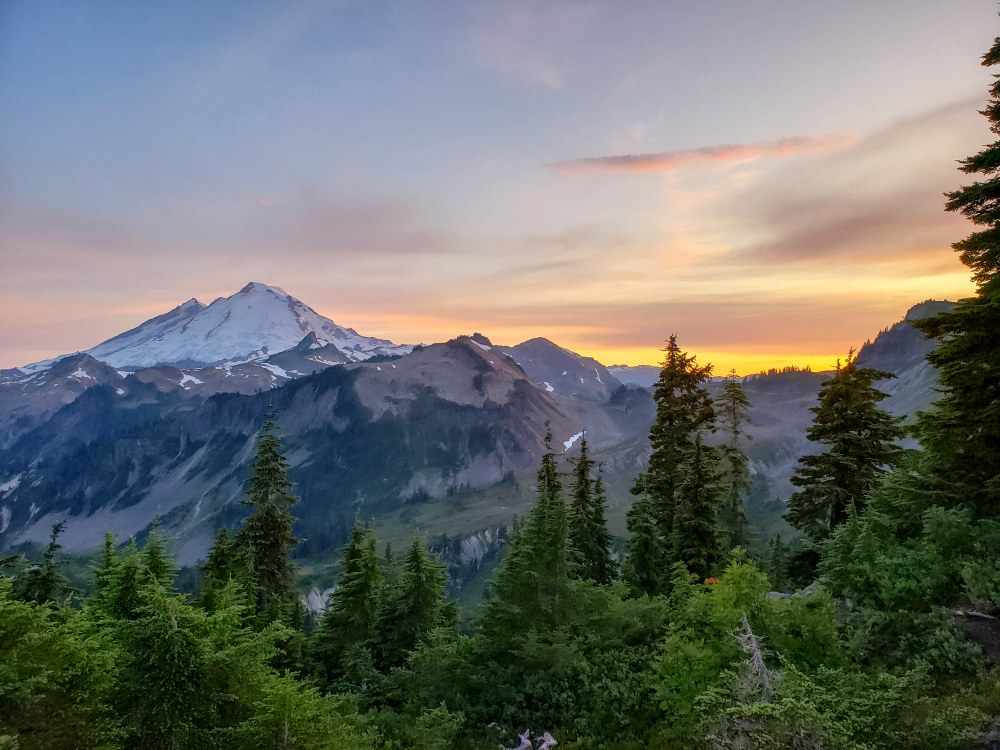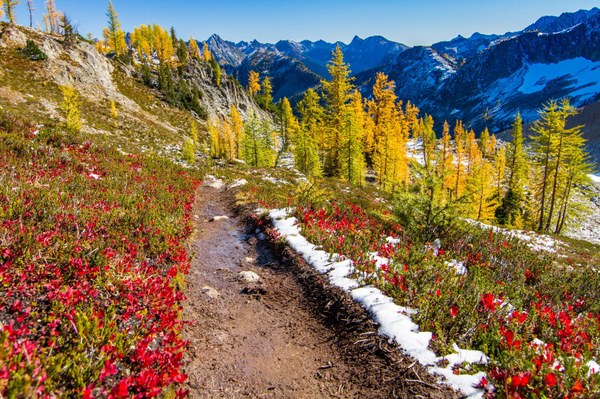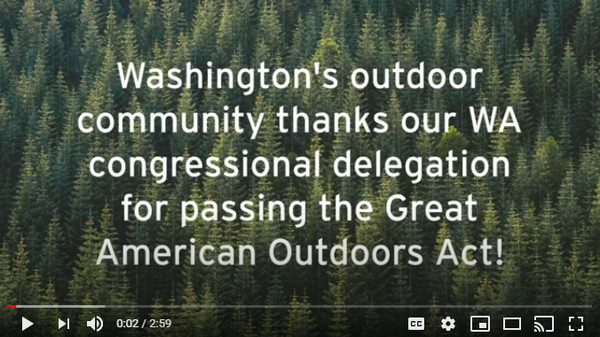
As Mountaineers, we’re intimately connected with wild places. Some of us were introduced to the outdoors through The Mountaineers: a scrambling trip sparked a lifelong love for the North Cascades or a guidebook from Mountaineers Books introduced us to our first hike. Some of us join to deepen our love for the outdoors through new friendships and adventures. Regardless of what brought us here, we're united by our fierce love for the places we explore and our strong desire to protect them.
Our conservation and advocacy work catalyzes this passion into purpose. We educate our community to be responsible recreationists and good stewards of the environment. We inspire the outdoor community with our Braided River conservation books, and partner with grassroots efforts to preserve threatened landscapes in our backyard and beyond. We steward the places we explore through thousands of hours of volunteer service. And we advocate for funding, shape legislation, and engage in land planning processes to protect the public lands that make our adventures possible, through deep policy expertise and community engagement.
When you provide a charitable contribution to The Mountaineers, a portion of your gift directly supports our organization’s influential conservation and advocacy work. In this edition of Impact Giving, we offer you an insider’s look at how we utilize those funds to improve outcomes for our public lands, and the tangible results your support makes possible.
Past and Present
The Mountaineers has a long history of speaking up for wild places. From the formation of Olympic National Park in 1938 to the recent expansion of the Alpine Lakes Wilderness, we can collectively make a difference through member engagement and impact publishing. Every day, today's Mountaineers recreate on lands protected by yesterday's Mountaineers.
 Conservation has been core to our mission since our inception. One of our favorite stories to tell is how Governor Evans and a Mountaineers Book inspired President Ford to create the Alpine Lake Wilderness we know and love today. North Cascades Trail. Photo by Ida Vincent.
Conservation has been core to our mission since our inception. One of our favorite stories to tell is how Governor Evans and a Mountaineers Book inspired President Ford to create the Alpine Lake Wilderness we know and love today. North Cascades Trail. Photo by Ida Vincent.
The Mountaineers modern conservation work builds on this legacy. Our conservation engagement model incorporates advocacy, stewardship, and education to achieve long-term outcomes to protect public lands and the outdoor experience. This makes The Mountaineers unique in our approach to conservation by inspiring and engaging the outdoor community to take action.
Our advocacy happens where conservation and recreation overlap. Our work focuses on protecting public lands and the experiences they provide. We do this by shaping legislation, engaging in land planning processes, advocating for public lands funding, and empowering outdoor enthusiasts to take action. Mountaineers donors play a key role in the success of this work through their financial support, which provides staff leadership to guide these efforts and supports the communication tools and infrastructure to make community engagement possible.
Power of Partnerships
Just like working together is essential to achieving mountain summits, much of our conservation and advocacy efforts are done in partnership with other organizations. We work with national conservation and recreation organizations like Outdoor Alliance and the Wilderness Society, state-based organizations like Washington Trails Association and Washington Wild, and public lands recreation partners like the Access Fund and Washington Climber’s Coalition to build support for important issues. Helping bring this larger community together creates a more meaningful impact.
Together, we collaborate on joint comment letters to land managers, influence policy decisions by working closely with state and federal legislators, and develop advocacy campaigns to achieve shared conservation goals. We prioritize issues that affect national public lands because the majority of our programs take place there, including National Forests and Parks. We also engage strategically on issues affecting Washington State lands. Our advocacy efforts affect specific places Mountaineers recreate and support broader landscapes across the country. Recently, we've provided comments on forest planning in the Nooksack area, given feedback on how to manage increased visitation in Mount Rainier’s Nisqually Corridor, and opposed efforts to privatize public lands.
Empowering Mountaineers through Education
The Mountaineers are one of the most respected voices on conservation, and one of our biggest priorities is offering opportunities for Mountaineers to understand and meaningfully engage on outdoor issues. Through our blogs and monthly enewsletters, we work to translate difficult to read policy into digestible information and simple actions. We share opportunities (like our Action Alerts) for you to contact your legislators and land managers on urgent matters, creating a united voice for our public lands. And we represent our outdoor community at public events and policy meetings to share your voices and experiences with officials and legislators.
Hundreds of outdoor enthusiasts have taken our free Protecting Public Lands 101 e-Learning course to learn how to be a proficient public lands advocate, and even more have viewed our Low Impact Recreation Skills videos to become a more responsible recreationist. We teach these Leave No Trace (LNT) skills in our outdoor education programs and offer opportunities for our students to become LNT trainers.
Our publishing division Mountaineers Books educates people to enjoy the outdoors safely and responsibly, and inspire readers to become advocates to protect public lands. Through Braided River books and impact campaigns, and working with photographers and authors, donors, and grassroots groups, Mountaineers Books achieves conservation wins like no other publisher in the country.
What’s Next
Threats to public lands are mounting, including the climate crisis, rollbacks of environmental protections, inequitable access to the outdoors, and overcrowding. As outdoor enthusiasts, we must step up our efforts to ensure future generations are able to enjoy the outdoors as we do today.
Recently, we’ve accelerated our focus in addressing the climate crisis. Thanks to passionate volunteers and generous donors, we’ve taken tremendous steps to reduce our carbon footprint by installing solar panels and replacing inefficient light fixtures. This fall, we hosted legendary alpinist and environmentalist Conrad Anker, whose stories of the impact of climate change on wild places motivated us to take action.
Moving forward, we will provide more opportunities for our community to engage on climate action and continue our work to protect public lands for everyone. Stay informed about our conservation and advocacy work by subscribing to our monthly Conservation Currents enewsletter.
Made Possible By Donors Like You
Charitable giving supports 75% of The Mountaineers conservation and advocacy work. While many of our programs are supported by earned revenue, our conservation work relies almost exclusively on donations. We can only advocate, steward, and educate to protect our cherished wild places with the incredible support of our donors.
In addition to unrestricted charitable giving, some donors make restricted contributions to our conservation and advocacy work and others fund projects that reduce our organization’s carbon footprint. For more information contact development@mountaineers.org.
Big picture impact
When the power of partnerships and community engagement combine, we achieve meaningful and long-lasting conservation outcomes. Here are a few recent examples:
- In 2019, with over 5,000 of your individual actions, The Mountaineers helped to protect the Methow Valley from industrial-scale mining, designate the Mountains to Sound Greenway a National Heritage Area, and permanently reauthorize the Land and Water Conservation Fund. These bills were a part of the John D. Dingell, Jr. Conservation, Management, and Recreation Act that passed this Congress and was signed into law by the President.
- In 2019, The Mountaineers community volunteered 9,491 stewardship hours with hands-on restoration projects, work-parties, and trash clean-up days. Though our activity size is limited in the time of COVID-19, volunteer leaders are still offering a variety of stewardship outings. Use the "Stewardship" filter on the Activities page to find and sign up for upcoming activities.
- The Mountaineers played a leading role in shaping and advocating for federal legislation to fix the recreational permitting process. With the input of Mountaineers volunteer leaders and collaboration with local and national partners, we helped introduce the Simplifying Outdoor Access for Recreation (SOAR) Act in the U.S. Congress. Mountaineers have made their voices heard in every step of the process to help more people experience public lands.
- In 2020, The Mountaineers helped pass the most significant conservation funding bill in decades. The Great American Outdoors Act includes measures The Mountaineers has spent years advocating for, including finally ensuring full and permanent funding for the Land and Water Conservation Fund as well as establishing new funding to restore and maintain public lands. In total, the bill means as much as $2.8 billion a year for public lands, outdoor recreation, maintenance and restoration, and new green spaces.
 Washington's outdoor community thanks our WA congressional delegation for passing the Great American Outdoors Act! This video was produced by The Mountaineers in partnership with members of the outdoor community in Washington state. We are grateful for their partnership in this thank you message and your support for making it all possible!
Washington's outdoor community thanks our WA congressional delegation for passing the Great American Outdoors Act! This video was produced by The Mountaineers in partnership with members of the outdoor community in Washington state. We are grateful for their partnership in this thank you message and your support for making it all possible!
Impact Giving
At The Mountaineers, we rely on philanthropic support from individuals to sustain donor-funded programs like our Conservation and Advocacy Program you read about today.
This edition of Impact Giving is a part of our online series. For more information about how philanthropy makes a difference, check out our previous blogs:
- Why is Earned Revenue Not Enough?
- An Insiders Look on Scholarships
- How Year End Appeals Support The Mountaineers
- Planning your Legacy with The Mountaineers Summit Society
- How Fundraising Events Support The Mountaineers
- Peak Society Takes Us to New Heights
- How Philanthropy Supports Mountaineers Books
- How Fundraising Improves Outdoor Access Through Mountain Workshops
As we enter the season of giving thanks, consider a gift in honor of your favorite volunteer. Drop us a note and we can work with you to send a special thank you and notification of your gift.
- Your annual gift of $1,000 or more welcomes you into Peak Society, the leadership giving-circle of The Mountaineers.
- Consider planning for the future of Mountaineers Conservation efforts by leaving a bequest in your will or a gift of estate.
For more information or to ask questions about making a gift please reach out to us at development@mountaineers.org or call 206-521-6006.
The Mountaineers® is a 501(c)(3) organization supported through earned revenue and elevated through charitable contributions, tax ID:27-3009280, 7700 Sand Point Way NE, Seattle, WA 98115.
 The Mountaineers
The Mountaineers